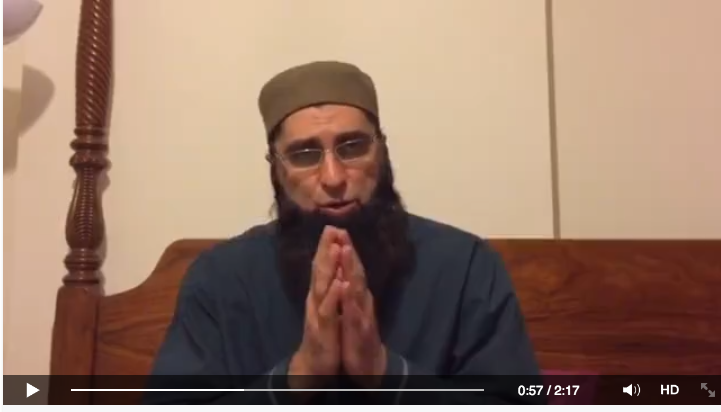Junaid Jamshed, a popular TV preacher in Pakistan, has issued a tearful video apology on Facebook after online religious groups accused him of blasphemy for disrespecting a revered figure in Islam, Prophet Mohammed's wife Aisha, in one of his TV sermons [2].
In Pakistan, blasphemy accusations are usually directed towards minorities and are taken very seriously, not just by the law, but by vigilantes ready to deliver justice.
In 2011, the Governor of Punjab Salman Taseer was assassinated [3] by his own guard after comments he made defending a Christian woman accused of blasphemy were misconstrued as blasphemy. His murderer was showered with petals as he left court. Last month, a mob burnt a young Christian couple to death [4], after a local cleric accused them of blasphemy. Forty people have been booked for their murder. Last week, the owner of Pakistan's largest media group was sentenced to 26 years in jail by a local court on blasphemy [5]charges, along with an actress and a TV host.
Junaid Jamshed [6]is one of Pakistan's most iconic pop stars from the 1980s. He left his music career 17 years ago to spread Islam. He regularly appears on religious channels giving sermons, reciting the Quran and praises of the Prophet Mohammad. He also owns an incredibly successful clothing retail line [7] and co-owns a chain of Halal meat stores.
In the one-minute video of his alleged controversial TV sermon [2], Jamshed narrates an animated story about the Prophet's wife Aisha faking an illness to get her husband's attention. He goes on to say, “This is evidence of the fact that even in the Prophet's company, a woman's nature can't change. A woman can't change, so don't try to change her. She is borne from a crooked leg, if you press too hard, it will break.”
Various groups have re-appropriated the video online; one of them even calls for him to be banned from entering mosques. This blog post translates a part of his sermon [8].
Pakistani journalist Maheen Usmani tweets:
Basically #JunaidJamshed [9] was on his usual misogynistic streak but this time he did not choose his target wisely so busy was he in cackling.
— Maheen Usmani (@MaheenUsmani) December 2, 2014 [10]
Businessman Haroun Rashid comments:
This is called getting run over by your own car while you're driving it. #JunaidJamshed [9]
— Haroun Rashid (@HarounRashid2) diciembre 2, 2014 [11]
Jamshed's remarks may seem misogynistic, but for some Muslim groups any disrespect to revered figures in Islam, including Prophet Mohammed's daughters and wives, is considered blasphemy.
On the Quranalyze website, blogger Mo Waseem writes: [8]
Although what Junaid Jamshed said about Hazrat Ayesha seems like an attempt of character assassination, I fail to see how that is more blasphemous than ISIS slaughtering people in the name of Islam, and why the outrage is not directed there.
Within eight hours, Jamshed's apology [1] has been viewed more than 600K times and shared by more than 50K people on Facebook. Here's a translation of his apology:
Respectable brothers, friends, elders and sisters. Sometime ago, during a sermon, because of my stupidity and ignorance, I said some incredibly inappropriate things that were completely against the glory of Honorable Aisha. This is my mistake, and that mistake is because of my ignorance. It is because of my lack of knowledge, I am not a scholar. I am not a legal expert. And I admit my mistake in front of the whole Muslim community and beg your forgiveness. And with a true heart I ask that God forgive me and I put my hands together before you and beg you to forgive me too. I am at fault and I accept and apologize for my mistake.
Many commenters on the video have accepted his apology and pleaded for others to forgive him.
Others, like Mo Waseem, brought up the unequal and unfair status of blasphemy laws in Pakistan:
Needless to say that I do appreciate Muslims forgiving him, I think this partial attitude does more harm than good, for it promotes double standards and hypocrisy! I wonder, why are people who belong to minority groups in Pakistan not given the same privilege, the same benefit of doubt when accused of blasphemy? Why are they not given the luxury of apologizing for their “mistake”, a mistake they may or may not even have committed? Why does the state not recognize that anti-blasphemy laws are mostly used to settle personal disputes and prejudices? What happened to the central Quranic commandment of standing up for justice impartially, even if it be against ourselves, or our family (Quran 4:135)?
Maheen Usmani echoed:
If #JunaidJamshed [9] with his oodles of knowledge & preaching of 17 yrs can be forgiven for #blasphemy [12], why not the Christian #AasiaBibi [13]?
— Maheen Usmani (@MaheenUsmani) December 2, 2014 [14]
Others expressed concern for the workers [15]who managed dozens of Junaid Jamshed's popular clothing retail stores across the country. A Twitter user posted an image of a store closed with a sign detailing his apology:
Say “hello” to JJ #JunaidJamshed [9] Greetings JAe pic.twitter.com/jTCCvwr5sC [16]
— Fathe (@FatheTiyab) December 1, 2014 [17]
Emmad Hameed, a sports journalist, commented [18] in a Facebook post:
Any harm to JJ can plummet us to new depths, how about repealing the blasphemy law altogether…How about playing this card smartly now and forcing these Jahil Maulvis (ignorant preachers) to abandon the law once for all…This might be an actual opportunity of fixing this $%&* forever!
